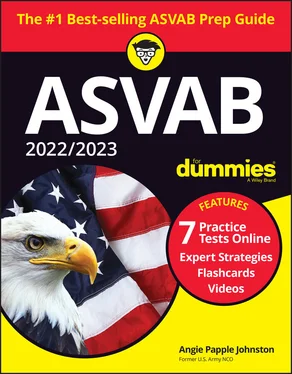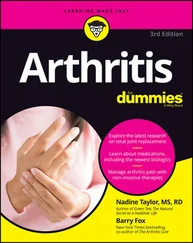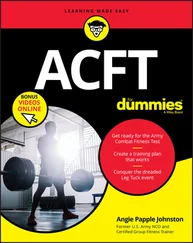After you do some additional studying, take the second practice exam. Again, try to duplicate testing conditions. Check your answers. Compare your scores to the scores from your first test. Have you improved? If so, continue studying as you have been. If not, reconsider how you’re studying or whether you’re setting aside enough time to study. A school counselor or teacher can give you additional study pointers. Continue practicing with the next few tests.
A couple of weeks before the ASVAB, take the next-to-last practice test. Brush up on any of those nagging areas that still give you fits. Check to see which areas you need help with and spend more time studying those areas.
A week before your test date, take the last test. This test helps you calm your nerves before taking the ASVAB — how the test works will be fresh in your mind.
 Don’t waste time memorizing the practice questions in this guide or any other ASVAB study guide. You won’t see the same questions on the ASVAB. Use this guide and the sample tests for two purposes:
Don’t waste time memorizing the practice questions in this guide or any other ASVAB study guide. You won’t see the same questions on the ASVAB. Use this guide and the sample tests for two purposes:
To determine the subject areas in which you need to improve: Use the tips and techniques, along with standard study materials (like high school textbooks), to improve your knowledge of each specific subject.
To familiarize yourself with the types of test questions and the way they’re presented on the test: Getting a good idea of what all the subtests look like will improve your test-taking speed. You won’t have to spend time trying to figure out how a question looks. You can spend your time answering the question.
Making Last-Minute Preparations: 24 Hours and Counting
 You want some good advice? Don’t drink alcohol the night before — headaches, dehydration, and the ASVAB don’t work well together. And don’t pull an all-night cram session. If you don’t know the material the night before the test, it’s too late. Staying up all night only guarantees that you’ll do poorly on the test, because you’ll be too tired in the morning. Here are some other suggestions:
You want some good advice? Don’t drink alcohol the night before — headaches, dehydration, and the ASVAB don’t work well together. And don’t pull an all-night cram session. If you don’t know the material the night before the test, it’s too late. Staying up all night only guarantees that you’ll do poorly on the test, because you’ll be too tired in the morning. Here are some other suggestions:
Get some sleep. A full night’s rest (at least eight hours) before the test prepares your body and mind to perform at their best during the test. When you get enough sleep, your brain actively organizes information you studied and know so you can remember it more easily during your test. Even better is starting a regular sleep schedule at least two or three nights before the test to be fully rested.
On the morning of the test, eat a light meal. Anything too heavy will make you drowsy, but not eating enough will make it hard for you to concentrate.Try to avoid eating a breakfast high in carbohydrates and sipping energy drinks. Although the carbs and caffeine will initially make you feel energetic, a couple of hours into the test, you may come crashing down. Select foods high in protein instead.
Get exercise the day before and even the morning of the test. Doing so gets your blood pumping and helps you remain mentally sharp.
If you’re sick, upset, or injured, consider rescheduling the test. Right before the test starts, the proctor will ask if there’s anything, such as sickness or injury, that may affect your test performance. After the test actually starts, it’s considered an “official test,” and you’ll have to wait a certain time period before any possibility of a retest. See Chapter 1for details.
Don’t bring personal supplies to the test. Your test administrator will provide you with pencils and scratch paper. Don’t bring calculators, personal electronic devices (smartphones, tablets), backpacks, or a cooler of munchies to the testing site. You won’t be allowed to have them with you. (But if you wear eyeglasses, bring them.)
Bring a watch to help you keep track of time if you’re taking the paper version. The computerized version has a clock on the screen.
Don’t drink a lot of liquids just before the test. You don’t want to waste valuable test time in the restroom!
Make sure you arrive at the test site with plenty of time to spare. In the military, arriving on time means you’re 5 minutes late. You should plan to be in your seat at least 15 minutes before the scheduled testing time. Unless your recruiter is driving you (which is often the case), you may want to do a test run a day or two before your testing date to make sure you know where the test is, the availability of parking, and how to find the testing room.
Bring your ID. You’ll have to show proof of your identity when you arrive at MEPS.
Getting Access to the Online Test Bank
Accessing the online test bank that comes with this book is as easy as clicking a few buttons. First, visit www.dummies.com/go/getaccess . Then select the name of the book from the drop-down menu (it’s listed as 2022/2023 ASVAB For Dummies). Follow the onscreen prompts to validate your purchase and enter your email address. You’ll receive an email with your PIN and instructions on getting to the test bank (plus hundreds of flashcards you can use to practice your skills) by visiting www.dummies.com and looking for the text that says “Have a book PIN? Activate Now.”
Part 2
Words to Live By: Communication Skills
IN THIS PART …
Brush up on vocabulary lessons that will help you ace the Word Knowledge subtest. Review prefixes, suffixes, and roots, and distinguish between synonyms and antonyms.
Get help tackling the Paragraph Comprehension subtest, and check out the different types of questions you’ll encounter.
Work some practice questions at the end of each chapter to help you determine where you excel and where you could use some more review.
Chapter 4
IN THIS CHAPTER
 Being well-spoken in the military
Being well-spoken in the military
 Seeing some example questions
Seeing some example questions
 Keeping a word list
Keeping a word list
 Knowing the difference between synonyms and antonyms
Knowing the difference between synonyms and antonyms
 Improving your overall vocabulary
Improving your overall vocabulary
To make it to basic combat training, you need a pretty decent vocabulary that helps you score well on the Word Knowledge subtest of the ASVAB. Not only do you have to know how to spell to some degree (so you can differentiate among words), but you also need to know what the words on the test mean. The military wants to know how big your vocabulary is so it can determine whether you’ll be able to communicate with other troops, understand written and spoken instructions, report to higher-ups, and lead junior servicemembers.
So, what if you don’t know the difference between a carbine and a carbon? Never fear — I’m here to give you a helping hand (or bestow upon you inestimable guidance and encouragement, if you prefer). With the help of this chapter and a little work on your part, you can whip your word-knowledge skills right into shape. And then at the end of the chapter, you can check out the practice questions to test those skills.
Читать дальше

 Don’t waste time memorizing the practice questions in this guide or any other ASVAB study guide. You won’t see the same questions on the ASVAB. Use this guide and the sample tests for two purposes:
Don’t waste time memorizing the practice questions in this guide or any other ASVAB study guide. You won’t see the same questions on the ASVAB. Use this guide and the sample tests for two purposes: You want some good advice? Don’t drink alcohol the night before — headaches, dehydration, and the ASVAB don’t work well together. And don’t pull an all-night cram session. If you don’t know the material the night before the test, it’s too late. Staying up all night only guarantees that you’ll do poorly on the test, because you’ll be too tired in the morning. Here are some other suggestions:
You want some good advice? Don’t drink alcohol the night before — headaches, dehydration, and the ASVAB don’t work well together. And don’t pull an all-night cram session. If you don’t know the material the night before the test, it’s too late. Staying up all night only guarantees that you’ll do poorly on the test, because you’ll be too tired in the morning. Here are some other suggestions: Being well-spoken in the military
Being well-spoken in the military










